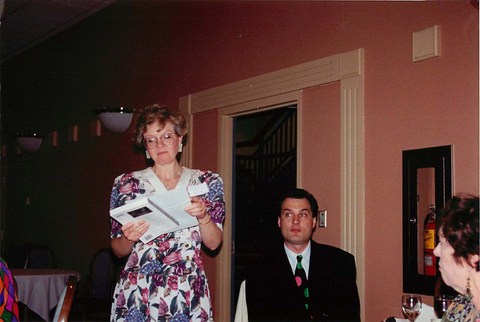 |
Bonnie Shewan Burroughs (B.MUSIC HONOURS,
1971):

A Memoir of the Teacher Who has most Strongly
Influenced Me:
I first laid eyes on this vibrant, beautiful woman with
a strange accent in 1967, when by some strange and wonderful
happenchance, someone else wished to transfer out of her class
and I was to take her place. I became a lifelong student of
Dr. Bratuz's at that moment, but the scope and impact took
years to register!
"Our aim," she says, "is to sharpen our ear
and enrich our vocabulary, not in order to 'judge' but in
order to acquire greater knowledge and with it to come nearer
to the work of art." Elsewhere she writes, "the
quality of the result depends on the quantity of skills and
images one has absorbed, stored, assimilated…..it is
above all necessary to be receptive."
I loved hearing the story of the three stonecutters; possibly
because my own great-grandfather was a stonecutter for the
Parliament buildings in London, England. They were doing the
same things, but to one it meant just cutting stones, the
other earning his bread, but to the third building a cathedral.
Dr. Bratuz continued, "similarly, some people hear sounds,
others emotions, others still the art – the combination
of craftsmanship and vision – in a musical work, or
in its performance. The music presents us with a crystallization
of the so-called feelings, which we must detect and decode
according to certain musical symbols which belong to a school
or to a composer. We must acquire a historical perspective
which can enable us not to superimpose, say, on Schubert,
the psychological world of Schumann. It would be like adding
to Raphael a few impressionistic strokes, because 'we feel
it so'……Only by familiarizing ourselves with the
cultural world which nourished a composer can we hope to gain
sufficient insight into his work. We need to read great literature,
familiarize ourselves with great art, in order to expand and
deepen our sensitivity."
In other words, over twenty years ago, teaching piano, Dr.
Bratuz was espousing INTEGRATION! We were to read, study and
absorb the poets, writers and artists of the time, reading
their biographies and their letters, and of course studying
to gain an historical, geographic and political perspective,
not to mention scientific exploration and the interaction
with other composers of the day.
In a Master Class, she would let us hear two readings of a
portion of Shakespeare to explain the concept of unity among
other things. One was a beautiful, insightful and faithful
interpretation of the text which illuminated the depth and
meaning within the art; the other an example of an actor with
many skills but the reading did not illuminate the text but
only used it as a vehicle for self-display. It was an extremely
vivid way of presenting the importance of understanding structure,
musical grammar, syntax, cadence, and respecting the individual
composer's use of language.
Another quote from Dr. Bratuz is, "only in contact
with great thoughts can one learn to produce some oneself."
A Whole Language advocate over twenty years ago!
However, my most vivid memories are her demonstrations during
lessons, watching her hands, listening to the sounds and particularly
to her problem-solving skills or techniques. No matter what
difficulty I brought to her, it was a tremendous learning
experience to hear her articulate the stages of solutions
with an infectious enthusiasm and great joy at the end. When
I reflect upon that fact, I realize that I instinctively adopted
that attitude to my lifelong learning; and for that, I am
very grateful.
Back to Written
Tributes
|